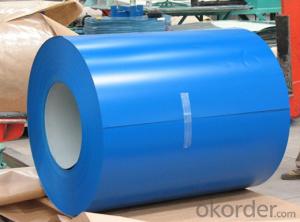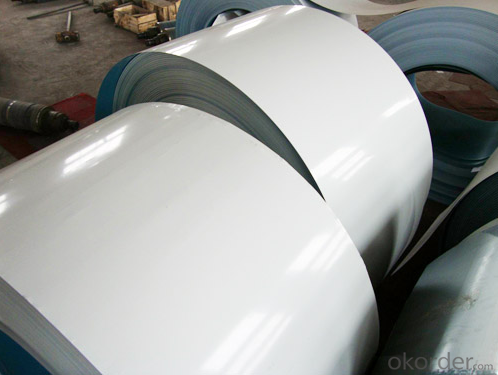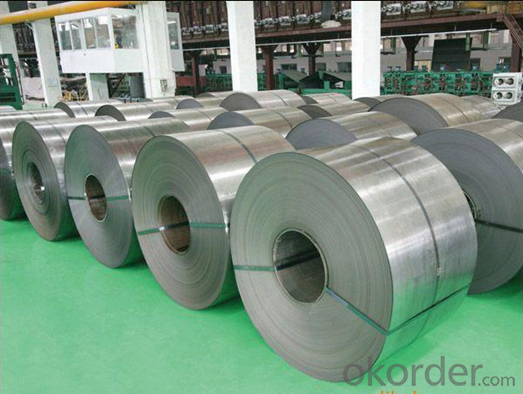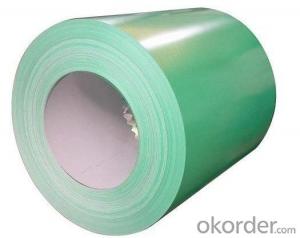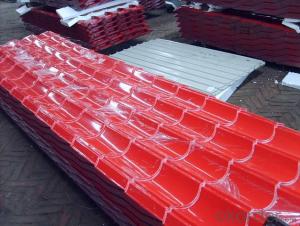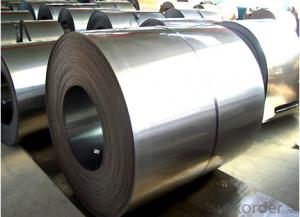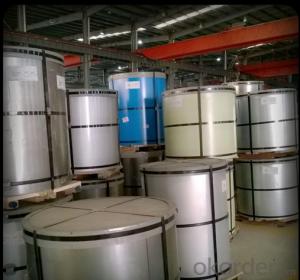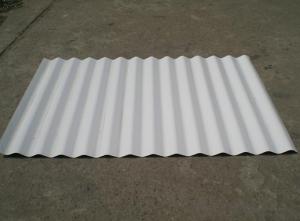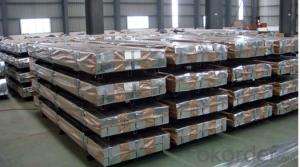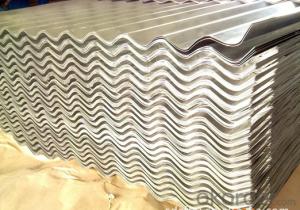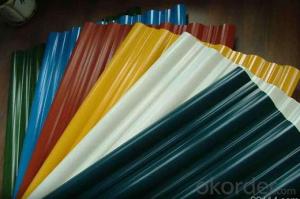Pre-Painted Steel Coil Thickness 0.9mm Width 1250mm
- Loading Port:
- China main port
- Payment Terms:
- TT OR LC
- Min Order Qty:
- 50 m.t.
- Supply Capability:
- 1000000 m.t./month
OKorder Service Pledge
OKorder Financial Service
You Might Also Like
Product Description
Specifications;
1. Aluzinc coating mass: 30g-275g/sqm
2. Coil weight: 4-6 tons per coil
3. Edge treatment: Mill edge or cut edge.
4. Technical treatment: Bright annealed, flatting, cold harden.
5. Surface treatment: Annealed, bright finish, dull/bright finish, slit edge.
6. Spangle: Normal/small/big/zero spangle.
7. Delivery terms: FOB / C&R / CIF
8. Supply Ability: 30000MT/month
9. Application: The construction industry: The roof structure, keel, grill, Clapboard, ceilings, fire shutter doors, etc; The light industry, the Automobile, agriculture, animal husbandry, fishery, casing of household Electronic application, civilian smoke stack, etc.
10. Delivery time: Within 30 days after the receipt of L/C or Signed the contract or according to customer's requirement.
Special design available according to requirement; Anti-corrosion And high-temperature resistant with black painting; All the production process Are made under the ISO9001: 2000 strictly
Second Glance of Photo
Galvanzied steel coil( GI, CRC)
Color coated steel coil(PPGI)
Package: Sea worthy Export Packing Standard export and seaworthy packing. (waterproof paper and metal sheet protection with fluted rings at inner and outer edges, 4 eye bands and 4 circumferential bands fasten the coil)
NAME | PPGI | GALVANIZED | GALVALUME/ALUZINC |
CERTIFICATE | ISO9001:2008 | ||
| EN10142 | ASTM A653 | ASTM A792 |
| CGCC | SS GRADE33-80 | GRADE33-80 |
MODEL NO | 0.16MM-1.5MM*1250MM OR UNDER | (0.12-1.5)*1250MM OR UNDER | 0.16MM-1.5MM*1250MM OR UNDER |
| Steel coil | Steel coil | Steel coil |
| Hot rolled-cold rolled | Hot rolled-cold rolled | Hot rolled-cold rolled |
SURFACE | Mini/regular/big/zero spangle, | Mini/regular/big/zero spangle, | |
APPLICATION | Structural use ,roofing, commercial use, household appliance, industry, family | ||
SPECIAL | Wear resistant steel, high- strength - steel plate | ||
Applications:
Pre-painted steel metal products are used in a vast array of applications including:
1.construction industry
2. household appliances
3.automotive
4.industrial applications
5.packaging
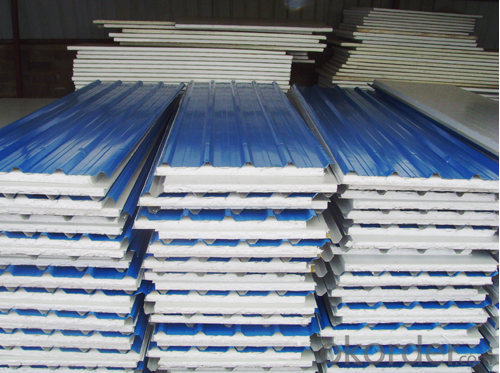
FAQ
1. Do you have QC team?
Yeah, sure, our QC team is very important, they will keep the quality control for our products.for quality inspection every day.
- Q: Just wondering how good are forge steel screw drivers, tool boxes(organisers) and pliers are, as screw fix are having a january sale, and looking to add to my tool collection. Thanks in advance
- I answer 2 questions a week from people wondering if so-and-so brand make good tools. Listen I am a Professional Contractor, and I will tell u my guys and I hammer the **** out of them. I follow 1 simple rule when buying tools- buy the best u can afford always. In the case of screwdrivers, wrenches, handtools.....buy craftsman. Spend a little more now and save lots later. The collection u are adding to will thank you.
- Q: How are steel coils inspected for surface cleanliness after processing?
- Steel coils are inspected for surface cleanliness after processing through visual inspection methods, such as using bright lights and magnifiers to spot any visible contaminants or defects. Additionally, various non-destructive testing techniques, like ultrasonic testing or magnetic particle inspection, may be employed to detect any hidden surface irregularities or contaminants.
- Q: How are steel coils used in the manufacturing of metal containers?
- Steel coils are used in the manufacturing of metal containers as they are processed into flat sheets or strips, which are then cut, formed, and welded to create the desired shape and size of the container. The coils provide a strong and durable material that can withstand the pressure and weight of the contents inside the container, ensuring its structural integrity and longevity.
- Q: How are steel coils processed for different finishes?
- Steel coils can be processed for different finishes through various methods. One common process is called coil coating, where the steel coil is cleaned, primed, coated, and cured to achieve a desired finish. This process includes removing any contaminants from the surface of the coil, applying a primer to enhance adhesion, and then coating it with a specific paint or coating material. The coated coil is then cured at high temperatures to ensure proper adhesion and durability. Another method for processing steel coils is through galvanization. In this process, the steel coil is coated with a layer of zinc to protect it from corrosion. This can be done through hot-dip galvanization, where the coil is immersed in a bath of molten zinc, or through electro-galvanization, where a thin layer of zinc is electroplated onto the coil. The galvanized finish provides excellent corrosion resistance and can be further processed to achieve different aesthetic finishes. Additionally, steel coils can be processed for different finishes through various surface treatments. This may involve processes such as pickling, where the coil is treated with an acid solution to remove scale and impurities, or mechanical treatments like brushing or grinding to achieve a desired texture. These surface treatments can be followed by applying a protective coating or paint to enhance the appearance and durability of the coil. Overall, the process of achieving different finishes on steel coils involves a combination of cleaning, coating, curing, and surface treatments. The choice of specific methods depends on the desired finish and the intended application of the steel coil.
- Q: This EN10025 S355JR is a European code for steel, of which the properties can be found here.
- *EN 10 025 S355JR/JO is comes under structural steel catagories. Equivalent standard is-ASTM A 572 Gr 50. -Above areHigher strength micro-alloyed steel. -The above-mentioned structural steel grades may be welded using any of the standard metal arc and resistance welding processes, usually without any special precautions.
- Q: I'm pretty sure that this topic has been beaten to death by now. But, I still can't get a definite answer. With stainless steel, you get better corrosion resistance, and you will hold and edge longer. With carbon steel, you will hold a sharper edge, and you could forge a knife blade longer than 2 ft without breakage. I'm personally a fan of stainless steel ( the 440 grade stuff ), just because it seems to hold up to use and abuse better in the long run. HOWEVER, I have NEVER had a factory made knife break on me. I don't think that they would try to sell you a knife that didn't do what it was meant to do, at least to a reasonable degree. (I work for a living, and can't afford a custom $600 knife.) What do you think? Is this a pointless topic? Will there ever be a winner?
- You didn't say WHICH type of stainless steel, which will make all the difference. There are $2 stainless steel knives and $200 stainless steel knives. The best stainless knife steels will rival the best high carbon steels when it comes to edge-holding properties. These days MOST of the best knives on the market are made from premium stainless steels because of the lower maintenance, but a high carbon steel knife has classic appeal and great edge-holding properties.
- Q: How are steel coils used in the manufacturing of automotive components?
- Steel coils are used in the manufacturing of automotive components by being processed and shaped into various parts such as body panels, frames, suspension components, and engine parts. The coils are typically cut, formed, and welded to create the desired shape and strength required for each specific component. The use of steel coils allows for the production of durable, strong, and cost-effective automotive parts that meet the industry's high standards for safety and performance.
- Q: How are steel coils used in the manufacturing of wind turbines?
- Steel coils are used in the manufacturing of wind turbines for various purposes, including the fabrication of tower structures, rotor blades, and other components. The steel coils are typically processed and shaped into specific forms, such as rolled sections for tower construction or sheets for blade manufacturing. These coils provide the necessary strength, durability, and structural integrity required for the efficient and reliable operation of wind turbines.
- Q: What are the different coil winding methods used for steel coils?
- There are several different coil winding methods used for steel coils, each with its own advantages and applications. 1. Layer winding: This is the most common method used for steel coils. It involves winding the steel strip or sheet in concentric layers, one on top of the other, to form a coil. This method is ideal for thin, narrow strips and provides good stability and strength to the coil. 2. Cross winding: In this method, the steel strip is wound in a crisscross pattern, alternating the direction of each layer. This helps to distribute the stress evenly across the coil and prevents the coil from becoming unstable. Cross winding is commonly used for thicker or wider steel strips. 3. Spiral winding: This method involves winding the steel strip in a spiral pattern, forming a coil with a gradual increase in diameter. Spiral winding is often used for large or heavy steel coils, as it allows for easy handling and transportation. It also provides good stability and prevents the coil from collapsing. 4. Toroidal winding: This method is used for producing toroidal or donut-shaped coils. The steel strip is wound in a circular path, with each layer placed inside the previous one. Toroidal winding is commonly used in applications such as transformers, where the coil needs to have a specific shape and size. 5. Interleaved winding: This method involves interleaving two or more steel strips together during the winding process. Interleaved winding is used to produce composite coils with different materials or thicknesses. It provides enhanced strength, stability, and allows for customized designs. Each of these coil winding methods has its own advantages and is used based on the specific requirements of the steel coil application. The choice of method depends on factors such as strip thickness, width, tensile strength, and desired coil properties.
- Q: Can steel coils be coated with magnetic materials?
- Yes, steel coils can be coated with magnetic materials. The coating process typically involves applying a thin layer of magnetic material, such as nickel or zinc, to the surface of the steel coils. This coating enhances the magnetic properties of the steel, making it more suitable for specific applications that require magnetism.
Send your message to us
Pre-Painted Steel Coil Thickness 0.9mm Width 1250mm
- Loading Port:
- China main port
- Payment Terms:
- TT OR LC
- Min Order Qty:
- 50 m.t.
- Supply Capability:
- 1000000 m.t./month
OKorder Service Pledge
OKorder Financial Service
Similar products
Hot products
Hot Searches
Related keywords
